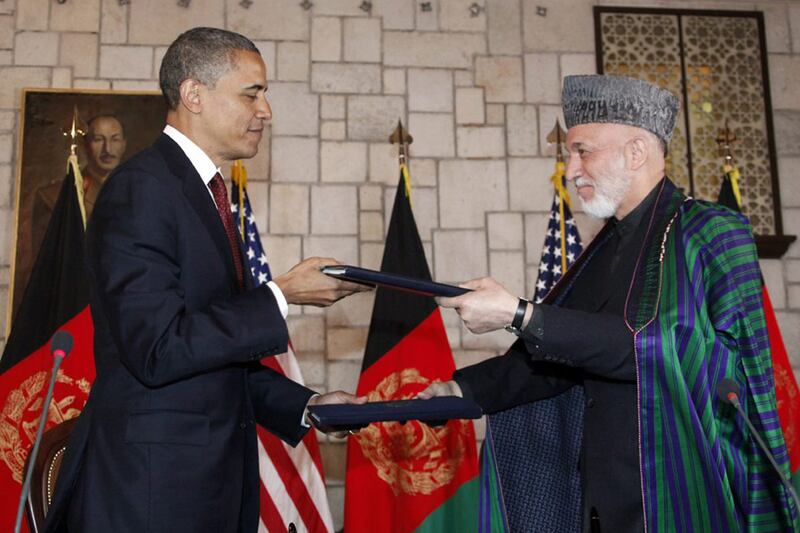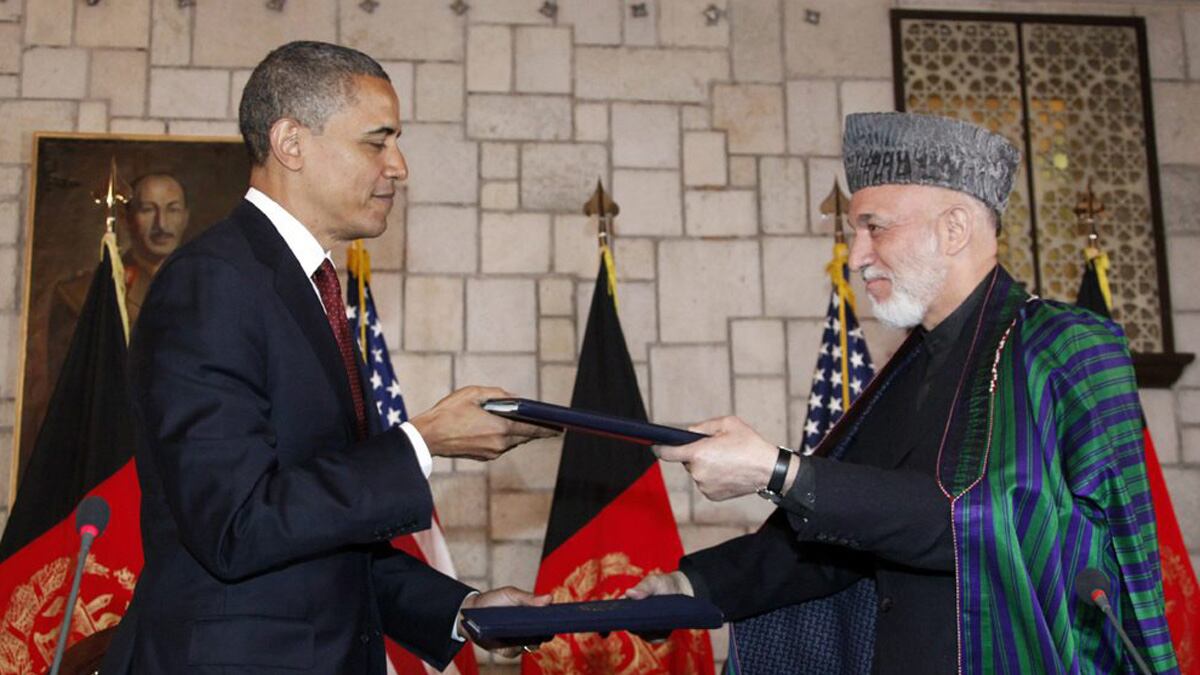For some Taliban members, President Barack Obama’s midnight visit to Kabul this week was their worst nightmare come true. Under the terms of the new strategic- partnership agreement he signed with Afghan President Hamid Karzai, the Afghan insurgents can now expect to face a long-term, residual U.S. military presence, as well as a decade or more of continued economic and development aid to the Kabul government. As a result, Taliban officials tell The Daily Beast, their dreams of overthrowing Karzai and reestablishing Mullah Mohammad Omar’s often brutal Islamic regime in Kabul have just become more difficult—if not completely unattainable. “Such a commitment from the U.S. and the West gives us a sense that the war will go on longer and longer and make our fight more difficult,” says a senior Taliban intelligence officer, declining to be quoted by name for security reasons. “Everyone is already tired of the war.”
More than that, these insurgents complain, the agreement is likely to raise the spirits of anti-Taliban Afghans who have been agonizing about what will come after the Americans’ 2014 troop withdrawal deadline. “I fear this deal will strengthen the morale of the Afghan National Army and of the Kabul regime,” the intelligence officer says. And sure enough, Afghan civilians and officials have welcomed the U.S. commitment, despite its dearth of specifics. They call it a victory for the Afghan president. In their view, Karzai’s persistent jawboning finally forced the Americans to promise to hand over control of all Afghan prisons and prisoners within six months and to put Afghan security forces rather than U.S. troops in the lead of the controversial night raids. “Karzai wrestled with the U.S. and won,” says one senior Afghan official who is close to the Afghan president. “We are excited by this deal and hope it will open the window for further serious agreements between the Afghanistan and the U.S.” the senior official tells The Daily Beast.
That prospect is leading some Taliban to believe that negotiation is the only alternative to a protracted—and possibly endless—guerrilla campaign. “Trying to win like we did in 1996 when we captured Kabul is now like trying to bring the moon to the earth,” says a senior Taliban official. “A long-term U.S. presence will hurt our chances and slow down our jihad.” The way to move things forward is to reopen the suspended peace talks in Qatar, he argues. “If the Taliban are smart, we will cash in on this opportunity of dealing with the West now,” he says. “We are not weak. In fact Obama is trying to strengthen the weak Kabul regime precisely because the West is afraid of the Taliban.”

Nevertheless, Taliban hardliners dismiss the importance of the partnership deal. In the long term, they say, Islamic ideology and the insurgents’ steely determination will overcome whatever military and economic aid America and its coalition partners may provide. “This is a war of sacrifice, not of green dollars,” says Bari Khan, a Taliban commander in Ghazni province. “The U.S. can continue to fight and protect the Karzai regime, but the day the U.S. leaves—which is inevitable—we will finish off Kabul’s security forces. Our goal is not to take over Kabul but to fight for the cause of Islam, regardless of time.”
Relations are tense between the Americans and their allies in the Kabul government. The Afghans are plagued by suspicions that Washington has ulterior motives in pledging to stay in Afghanistan for a decade beyond the 2014 troop-withdrawal deadline. Although Obama insists that America doesn’t want permanent military bases in Afghanistan, many Afghans fear that the long-term commitment could be a ruse to let the Americans use the country as a launching pad for military strikes against neighboring Iran and jihadist hideouts in Pakistan. “We do have some suspicions about why the U.S. wants to stay here,” says the senior Afghan official. “We want the Americans to tell us that they are here for Afghanistan, and not for wider regional interests.”
The senior official also worries that the Americans could overstay their welcome. Civilian deaths and cultural misunderstandings have already provoked violent anger and widespread disgust among Afghans. They remember the U.S. soldier’s rampage that killed 16 or 17 Afghan villagers this March; the burning of copies of the Quran in late February; the video of U.S. troops urinating on insurgents’ corpses, and the photos of American soldiers posing with the body parts of dead guerrillas. “Given Afghan sensitivities, a prolonged U.S. presence could create some big troubles,” the official says. “What happens if a girl is raped, or if our religion and traditions are insulted again?”
But those concerns are for the future. For now, most Afghans seem encouraged by the prospect of a long-term U.S. commitment to their country’s security and economic stability. “I’d support a U.S. presence in Afghanistan for the next 100 years,” says Daud Ahmadzai, a engineer and real-estate developer in Kabul. “This is a punch in the face to the Taliban and its supporters in Pakistan. This also is good news for my business, and for my three daughters, who won’t have to worry about not going to school again.” There’s just one question: how long will those good feelings last?







